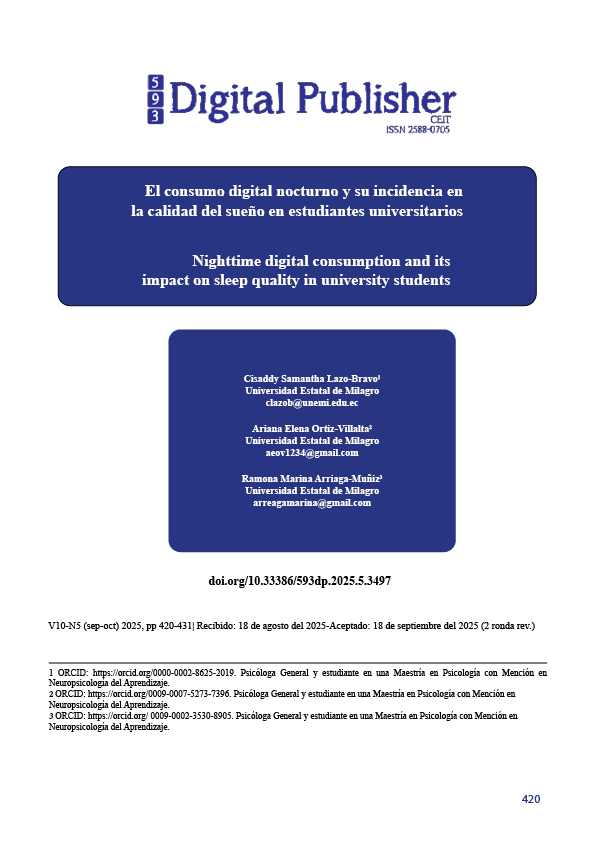Nighttime digital consumption and its impact on sleep quality in university students
Main Article Content
Abstract
Nighttime digital consumption has become a frequent habit among university students, with direct implications for sleep quality. In this context, the present study aimed to analyze the impact of nighttime digital consumption on sleep quality in second-semester students of the Pedagogy of Language and Literature program at Universidad Estatal de Milagro. The research adopted a quantitative approach, explanatory level, with a non-experimental and cross-sectional design. The population consisted of 95 students, to whom the Internet Addiction Test (IAT) and the Pittsburgh Sleep Quality Index (PSQI) were applied. The findings revealed that students experienced occasional difficulties in falling asleep in less than 30 minutes and frequent nocturnal awakenings, although without reaching severe levels of dysfunction. The linear regression model showed that Internet addiction explained 19.8% of the variability in sleep quality, confirming its significant impact. It is concluded that nighttime digital consumption constitutes a relevant risk factor for sleep disruption in university students, underscoring the need to promote institutional strategies aimed at technological self-regulation and education on healthy sleep habits. The limitations of the study include its cross-sectional design and the restriction to a single academic program, which limits the generalizability of the results. Future research should consider longitudinal designs and comparative samples across different academic contexts.
Downloads
Article Details

This work is licensed under a Creative Commons Attribution-NonCommercial-ShareAlike 4.0 International License.
1. Derechos de autor
Las obras que se publican en 593 Digital Publisher CEIT están sujetas a los siguientes términos:
1.1. 593 Digital Publisher CEIT, conserva los derechos patrimoniales (copyright) de las obras publicadas, favorece y permite la reutilización de las mismas bajo la licencia Licencia Creative Commons 4.0 de Reconocimiento-NoComercial-CompartirIgual 4.0, por lo cual se pueden copiar, usar, difundir, transmitir y exponer públicamente, siempre que:
1.1.a. Se cite la autoría y fuente original de su publicación (revista, editorial, URL).
1.1.b. No se usen para fines comerciales u onerosos.
1.1.c. Se mencione la existencia y especificaciones de esta licencia de uso.
References
Acikgoz, A., Acikgoz, B., & Acikgoz, O. (2022). The effect of internet addiction and smartphone addiction on sleep quality among Turkish adolescents. PeerJ, 10, e12876. https://doi.org/10.7717/peerj.12876
Alimoradi, Z., Lin, C.-Y., Broström, A., Bülow, P. H., Bajalan, Z., Griffiths, M. D., Ohayon, M. M., & Pakpour, A. H. (2019). Internet addiction and sleep problems: A systematic review and meta-analysis. Sleep Medicine Reviews, 47, 51–61. https://doi.org/10.1016/j.smrv.2019.06.004
Arayici, M. E., Gultekin Arayici, S., Erkin Geyiktepe, O., & Simsek, H. (2025). Assessment of the Relationship Between Internet Addiction, Psychological Well-Being, and Sleep Quality: A Cross-Sectional Study Involving Adult Population. Behavioral Sciences, 15(3), 344. https://doi.org/10.3390/bs15030344
Ayran, G., Gundogdu, G., & Arslan Işık, N. (2019). Effect of Internet Addiction on Sleep Quality in University Students. Galician Medical Journal, 26(4). https://doi.org/10.21802/gmj.2019.4.8
Guo, C., Chen, M., Ji, X., Li, J., Ma, Y., & Zang, S. (2025). Association between internet addiction and sleep quality in medical students: a longitudinal study. Frontiers in Psychology, 16. https://doi.org/10.3389/fpsyg.2025.1517590
Hjetland, G. J., Skogen, J. C., Hysing, M., Gradisar, M., & Sivertsen, B. (2025). How and when screens are used: comparing different screen activities and sleep in Norwegian university students. Frontiers in Psychiatry, 16. https://doi.org/10.3389/fpsyt.2025.1548273
Kaewpradit, K., Ngamchaliew, P., & Buathong, N. (2025). Digital screen time usage, prevalence of excessive digital screen time, and its association with mental health, sleep quality, and academic performance among Southern University students. Frontiers in Psychiatry, 16. https://doi.org/10.3389/fpsyt.2025.1535631
Kopasz, M., Loessl, B., Hornyak, M., Riemann, D., Nissen, C., Piosczyk, H., & Voderholzer, U. (2010). Sleep and memory in healthy children and adolescents – A critical review. Sleep Medicine Reviews, 14(3), 167–177. https://doi.org/10.1016/j.smrv.2009.10.006
Lemola, S., Perkinson-Gloor, N., Brand, S., Dewald-Kaufmann, J. F., & Grob, A. (2015). Adolescents’ Electronic Media Use at Night, Sleep Disturbance, and Depressive Symptoms in the Smartphone Age. Journal of Youth and Adolescence, 44(2), 405–418. https://doi.org/10.1007/s10964-014-0176-x
Lin, P.-H., Lee, Y.-C., Chen, K.-L., Hsieh, P.-L., Yang, S.-Y., & Lin, Y.-L. (2019). The Relationship Between Sleep Quality and Internet Addiction Among Female College Students. Frontiers in Neuroscience, 13. https://doi.org/10.3389/fnins.2019.00599
Mishra, A. K., van Ruitenbeek, A. M., Loomans, M. G. L. C., & Kort, H. S. M. (2018). Window/door opening-mediated bedroom ventilation and its impact on sleep quality of healthy, young adults. Indoor Air, 28(2), 339–351. https://doi.org/10.1111/ina.12435
Nakshine, V. S., Thute, P., Khatib, M. N., & Sarkar, B. (2022). Increased Screen Time as a Cause of Declining Physical, Psychological Health, and Sleep Patterns: A Literary Review. Cureus. https://doi.org/10.7759/cureus.30051
Peiró-Velert, C., Valencia-Peris, A., González, L. M., García-Massó, X., Serra-Añó, P., & Devís-Devís, J. (2014). Screen Media Usage, Sleep Time and Academic Performance in Adolescents: Clustering a Self-Organizing Maps Analysis. PLoS ONE, 9(6), e99478. https://doi.org/10.1371/journal.pone.0099478
Pham, H. T., Chuang, H.-L., Kuo, C.-P., Yeh, T.-P., & Liao, W.-C. (2021). Electronic Device Use before Bedtime and Sleep Quality among University Students. Healthcare, 9(9), 1091. https://doi.org/10.3390/healthcare9091091
Samaha, A. A., Fawaz, M., El Yahfoufi, N., Gebbawi, M., Abdallah, H., Baydoun, S. A., Ghaddar, A., & Eid, A. H. (2018). Assessing the Psychometric Properties of the Internet Addiction Test (IAT) Among Lebanese College Students. Frontiers in Public Health, 6. https://doi.org/10.3389/fpubh.2018.00365
Tarrahi, M. J., & Rezaei Kahkha Zhaleh, M. (2022). Investigating Internet Addiction and Sleep Quality Correlation Among Students of Isfahan University of Medical Sciences in 2021. Health Scope, 11(3). https://doi.org/10.5812/jhealthscope-127242




